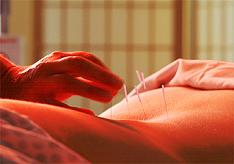|
Acupuncture
Most people at least have an idea of what it is. Many do not know that there is a difference between traditional and "medical" versions. Here are some questions and answers as published in a local patient brochure.
It is a method of encouraging the body to promote natural healing and to improve functioning, accomplished by the insertion of needles at strategic points throughout the body and then applying heat or electrical stimulation to them.
“How does it work?” The traditional Chinese explain that there are “channels of energy” that run in regular patterns throughout our bodies and on its surface, called "Meridians". Think of them as rivers flowing through the body, nourishing tissues. Any obstruction of these rivers is similar to a “dam” that backs up the flow in one part, and restricts it in others. These meridians can be influenced by “needling” specific points thus unlocking the obstructions at these “dams”, thus re-establishing normal energy flow. Modern day thinking states that stimulating (needling) these strategic points stimulates the nervous system to release chemicals in the brain, muscles and spinal cord. These chemicals can either alter the person’s perception of pain, or trigger the release of other chemicals or hormones which can influence the body’s own internal regulating mechanisms.
It is performed by a doctor who is trained and licensed in Western medicine, and also thoroughly trained in this ancient practice. It is also a system of approaches that is designed to influence three main areas of health: The promotion of health and well-being Prevention of illness Treatment of various medical conditions The World Health Organization (WHO) recognizes the use of acupuncture in the treatment of a wide range of medical problems, including:
Gastritis Hyper-acidity Spastic colon Constipation Diarrhea
Sinusitis Sore throat Bronchitis Asthma Recurrent chest infections
Headaches Facial tics Neck pain Rib neuritis Frozen shoulder Tennis elbow Various forms of tendonitis Low back pain (LBP) Sciatica Osteoarthritis
Typically not. Occasionally, original symptoms may worsen for a few days, or changes in appetite, bowel or urinary patterns may occur. These are temporary and signs that the treatment is beginning to work.
“What are the needles like, and do they hurt?” The needles are sterile, very thin, solid and made of stainless steel. Their points are smooth and less painful than those used for injections and blood transfusions.
“Is it covered by health insurance?” There are some insurance plans that do cover the procedure. Others do not. More and more companies are seeing its value, however. Some may even cover expenses by way of reimbursement for qualified services. Be sure to check your individual policy or plan for coverage before getting treated so there are no financial surprises.
For more Information, Click Here.
|

"We hope you enjoy your journey through Bone and Joint Pain.com"

